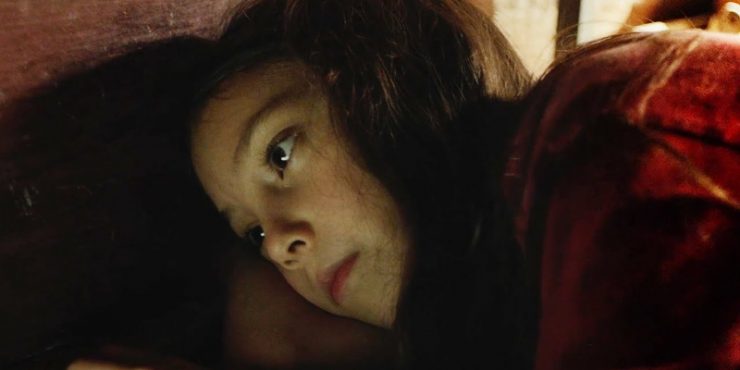In just over ninety minutes, the latest film from Lila Avilés feels like it contains the entire world. Tótem takes place almost entirely in a single home, during a single day and night, where an extended family prepares for a party. A young girl named Sol (played beautifully by Naíma Sentíes) wants to see her father. It’s his birthday – that’s what the party is for. But she can’t see him. He’s sick, she’s told repeatedly, he needs rest. The reality is that her father, Tonatiuh (Mateo García Elizondo), is dying of cancer. This party is less about his birthday, and more about everyone’s farewell. As Sol wanders her grandfather’s home, she seeks to understand the chaos of the adults around her, the differing ways in which they distract themselves from their despair. Sol is very young, but her fate is forcing her to learn a harsh lesson of life much too soon.
Avilés’s approach to the material – holistic and vérité, a perfect blend of docudrama realism and subjective point-of-view – comes from Sol’s perspective. Nobody is selling her any delusions. She knows from the film’s opening moments that her father is on pace to die very soon, and while the adults do their best to soften that reality, they are frank with her about what is going to happen. First, their is Sol’s mother, Lucía (Iazua Larios), a light-hearted performer who’s main focus is maintaining her daughter’s sense of normalcy. There is no dwelling on Tona’s illness, but instead the focus is on acquiring the birthday party’s balloons or arranging Sol’s crude clown costume. But then they arrive at the home of Tona’s father, Roberto (Alberto Amador), a pleasant enough home which is unfortunately stained with the arrival of death.
Roberto himself is a hardened man, speaking through a voice box if he ever speaks at all. His permanent taciturn expression watches his family with something close to annoyance, and his inability to process the current tragedy feels like a lifelong affliction. Tona’s sisters take a completely different tact. Alejandra (Marisol Gasé) frets over the details: the coloring of her hair, the cost of Tona’s medical care. Nuri (Montserrat Marañón) puts all her time and energy into making the perfect birthday cake, obsessing over specifics of decoration. It’s almost like she never wants to finish making the cake, like she never wants to say goodbye properly. Alejandra and Nuri have children of their own. Their concerns are trivial, unmotivated. They know their uncle is dying but the urgency is not there, a fact both mothers do their best to overcome.
This all feels like a set-up for overwrought melodrama, but Avilés’s film is not interested in spiking pathos here. By centering Sol, Tótem makes the observations feel like an awakening. Sol’s curiosity in the world – her childish love of animal facts and the various mysteries of the world – extends itself toward the adults around her, seeing their anguish and recognizing it within herself. It’s a maturation process, sure, but one that can only come with true introspection that most children aren’t forced to contemplate. I’ve never seen a movie recreate this with such authenticity, so confident in its thematic execution, mixing the hold of spiritual hope and the dulling recognition of mortality. Avilés steers away from nihilism and stops short of devout, instead occupying a middle ground of understanding, that so clearly replicates the experience of its young protagonist.
Teresita Sánchez plays Cruz, Tona’s in-home caretaker. She sees more of the dying man than anyone, and she gets the front row seat to all of his indignities and humiliations. Cruz is met with nothing but admiration from the family, but the expectations are still high. She’s meant to care for Tuna, but also babysit when needed, assuage the family’s anxieties when they get too high, smile politely when barriers are crossed. Avilés’s inclusion of Cruz – the way in which she, in fact, cares for the entire family – gives the film a proper context. Tótem explores the vast canvas of grief in such a granular way, but a stark reality is that none of them can meet Tona’s illness head-on. It’s only Sol who has the courage, who demands to see her father, only to be frequently denied by adults who lack the resolution to see what’s really happening.
There is a level of euphoria one feels when they see a movie all the way in January and are already convinced they’ve seen one of the best movies of the year. Tótem grips you from its opening moments, so intimate and playful, before flourishing into one of the most profound experiences I’ve had in a theater in a long time. Its conclusion, filled with such unabashed emotion, earns its catharsis through patient, intelligent storytelling. In only her second feature, Lila Avilés captures something indescribable; an ethereal journey through the knowledge that life itself does not unfold in a pattern. We tell ourselves stories in order to live, but those stories can never save us. When we realize that, it can be easy to fall into despair. Sol, and the film as a whole, instead steps toward grace and acceptance. Accepting that sadness is a fact of life, but also that we can control what that sadness makes of us.
Written and Directed by Lila Avilés










